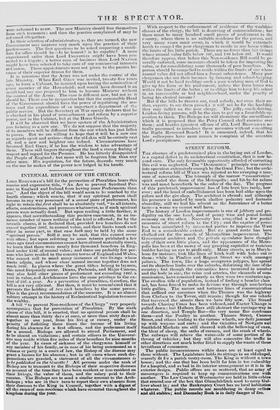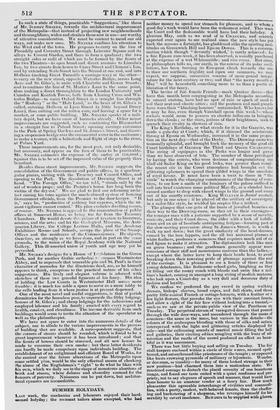STREET REFORM.
THE absence of a predetermined plan in the laying out of London, is a capital defect inn its architectural constitution, that is now be- yond cure. The only favourable opportunity afforded of correcting this evil was neglected. The "Destructive" principle was carried into operation extensively enough by the Great Fire ; but the archi-
tectural reform bill of WREN was rejected as too sweeping a mea- sure of renovation. The triumph of the narrow "conservative" spirit sealed the doom of the Metropolis ; and tit-by-bit reform was and must henceforth be the order of the day. The progress of this patchwork improvement has of late been less tardy, how ever; and the hand of embellishment has been laid alike upon the palace and the gin-shop. The architect is abroad; and although his presence is marked by much shallow pedantry and fantastic absurdity, still we hail his advent as the forerunner of a better taste—a worse we cannot well have.
The history of London improvements is one of jobbery and pro- digality on the one hand, and of penny wise and pound foolish economy on the other. Necessity has compelled a few partial measures of street reform in the City ; and the caprice of power lias been stimulated by interested parties to improve the West End to a considerable extent. But no grand route has been chalked out for the march of Metropolitan impsovement. The Government architect and the private speculator have thought only of their own little plans, and the appearance of the Metro- polis has been at the mercy of any grasping capitalist or tasteless builder having an eye to profit only. Many streets, as in Maryle- bone for instance, look like lines of brick wall with holes cut in them ; while in Pimlico and Regent Street we walk amongst palaces. The town, like a huge overgrown polypus, has spread
out its shapeless limbs over the suburbs, deforming the face of the country; but though the extremities have increased in number and the body in size, the veins and arteries, the channels of com- munication, have remained nearly as they were two centuries ago. The swollen tide of population, instead of finding a broader chan
nel, has been forced to make its devious way through numberless little gullies. The narrow and tortuous lines of communication that sufficed our ancestors when the Thames was the highway from Chelsea to the Tower, still remain; though for one vehicle that traversed the streets then we have fifty now. The Strand towards Charing Cross has been widened, and Exeter 'Change is pulled down ; but Holborn Bars still obstruct the carriage-way in one direction, and Temple Bar—the very name Bar condemns
them—and the Poultry- in another. Thames Street, Cannon
Street, and others leading to the various wharfs, are daily jammed up with wagons and carts ; and the vicinities of Newgate aild
Smithfield Markets are still cheered with the bellowing of oxen, the bleat of sheep, the oaths of carmen, and the crash of wheels. The railways will relieve the water-side of some portion of its throng of vehicles ; but they will also concentre the traffic in other directions not much better fitted to supply the wants of these leviathans of commerce.
The public inconveniences within doors are at least equal to those without. The Legislature holds its sittings in an old chapel, scarcely fit for a parish vestry-room. The King is without a town house; and the one that has been built for him is too unhealthy for a hospital, and as bad in its interior arrangement as it is in its exterior design. Public offices are so scattered, that an army of messengers is required to keep up communications one with another. The Law Courts at Westminster are held in little cabins that remind one of the box that Glumdalelitch used to carry Gul- liver about in; and the Bankruptcy Court has no local habitation whatever. The public records are mouldering in damp cella& and old stables; and Doomsday Book is in daily danger of fire. In such a state of things, practicable "Suggestions," like those of Mr. SIDNEY SMIRKE, towards the architectural improvement
of the Metropolis—that instead of projecting new neighbourhoods and thoroughfares, widen and straiten those now in use—are worthy of attentive consideration. We must be content to mend our old
ways, not make new ones. Mr. SMIRKE confines his attention to
the West end of the town. He proposes to carry on the line of Piccadilly and Coventry Street through Leicester Square and its alleys to Covent Garden, and there to form a quadrant; the two straight sides or radii of which are to be formed by the fronts of the two Theatres—to open broad and direct avenues to Lincoln's Inn, by two streets from hence to Carey Street and Clement's Inn,
and by extending Serie Street into the Strand at one end, and into Holborn (making Great Turnstile a carriage-way) at the other—
to carry on the new street, opposite Waterloo Bridge, across Long Acre and St. Giles's, to unite with Charlotte and Gower Streets; and to continue the line of St. Martin's Lane to the same point, thus making a direct thoroughfare to the London University and Camden and Kentish Towns, both from Charing Cross and Wa- terloo Bridge—to carry Oxford Street in a straight line through the " Rookery " or the "holy Land," as the heart of St. Giles's is called, entering Holborn at Lyon Street (a little beyond Drury Lane), thus cutting out the rotten core, and leaving a space for a
market, or some public building. Mr. SMIRKE speaks of a mili-
tary depitt, but we have enow of barracks already. Other minor improvements are suggested, such as continuing the Ilaytnarket in a straight line to Poland Street; opening carriage entrances to the Park at Spring Gardens and St. James's Street, and throw- ing a suspension-bridge over the ornamental water in the enclosure ; to make a terrace, with a balustrade and flight of steps to the river, at Palace Yard.
These improvements are, for the most part, not only desirable, but necessary, and appear on the face of them to be practicable.
Mr. SMIRKE estimates the expense of the outlay at 150,000/.; against this is to be set off the improved value of the property thus benefited.
Besides these street improvements, Mr. SMIRKE suggests the consolidation of the Government and public offices, in a quadran-
gular piazza, uniting with the Treasury and Council Office, and opening to the Park. The dissolution of Downing Street is at hand. "The Foreign Office," we are toll, "stands only by the aid of wooden props; and the Premier's house has long been the victim of the dry-rot." We are glad to find our reforming archi- tect raising his voice against the much-abused system of housing Government officials, from the Premier to the door-keeper. "It is," says he, " productive of nothing but expense, which the ut- most vigilance cannot control." His plan excludes dwelling rooms,
of' course. Mr. SMIRKE is OppOSed to the concentration of public
offices at Somerset House, as being too fits from the Treasury Chambers. He would devote this palace of taxation to literature, science, and the arts; and let the Geological Museum, the Anti- quarian Library, the College Lecture Halls, and the Academy Exhibition Rooms and Schools, occupy the place of the Stamp- Offices and the residences of the Commissioners. He objects, therelbre, as strongly as we have done, and in part on the same grounds, to the union of the Royal Academy with the National Gallery. This ill-assorted union of youth and age may yet be prevented.
Mr. SMIRKE'S designs for a House of I.e7islature in the Green Park, and for another Gothic cathedral t, surpass Westminster
Abbey, and to supersede that venerable pile and St. Paul's in their character of mausolea for the illustrious dead, are, as he himself appears to think, exceptions to the practical nature of his other suggestions. His lively and elegant volume is adorned with sketches of these two graceful figments of his fancy. His idea of holding the Law Courts in Westminster Hall seems more feasible : it is much too noble a space to serve as a mere lobby to the cells leading from it where justice is at present dispensed. One of the most novel and useful suggestions, is that of parish dormitories for the houseless poor, to supersede the filthy lodging-
houses of St. Giles's ; and cheap lodgings for the industrious and employed labourer and his family ; erected with every regard to health, corufbrt, and cleanliness. The income derivable from such buildings would seem to invite the attention of the speculator as well as the philanthropist.
We have not space to enter into the numerous details of the subject, nor to allude to the various improvements in the process of building that are available. A correspondent suggests, that the corners of streets should be rounded, which is found to be a great improvement wherever it has been introduced ; and that the fronts of houses should be stuccoed, and all new houses be made to consume their own smoke: but these latter desiderata can hardly be made compulsory upon individuals building. The establishment of an enlightened and efficient Board of Works, for the control over the future alterations of the Metropolis upon some settled plan, would be the only effectual means of checking She abuse of the Englishman's "right" to do what he likes with his own, which we daily see in the shape of monstrous abortions of brick and stucco, where dulness and absurdity contend for the honours of paternity. Nuisances can be put down, but architec- tural eyesores are irremediable.





















 Previous page
Previous page